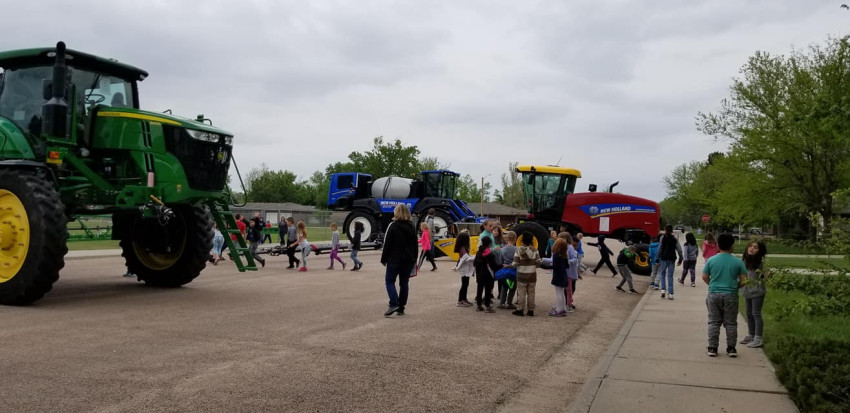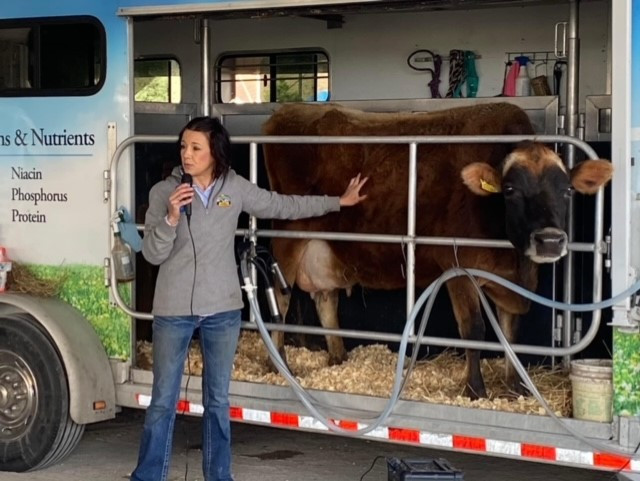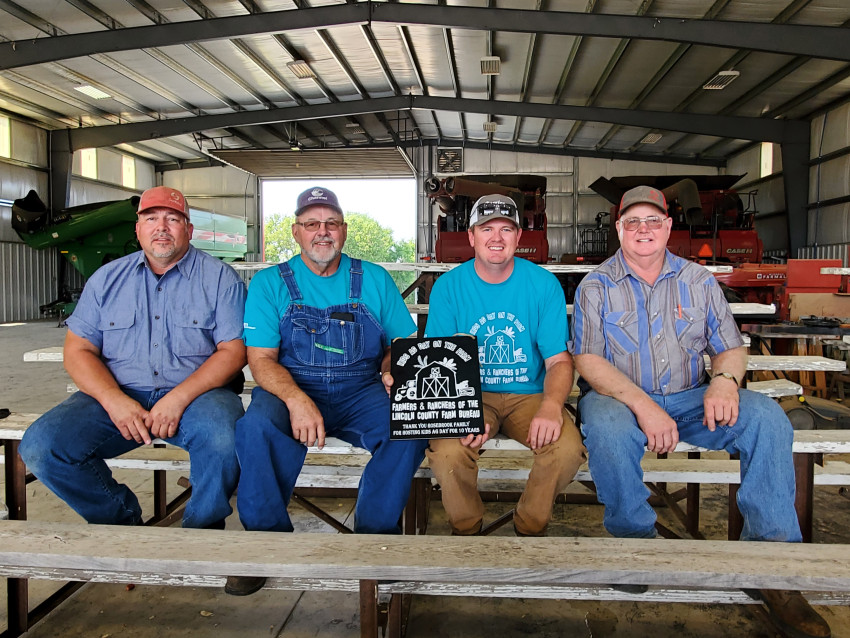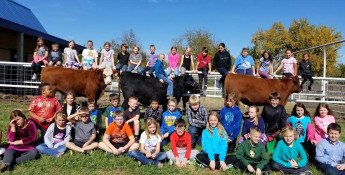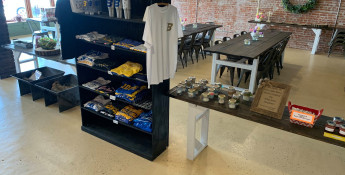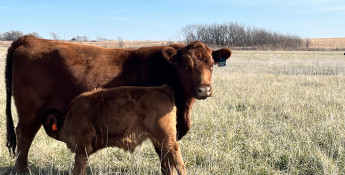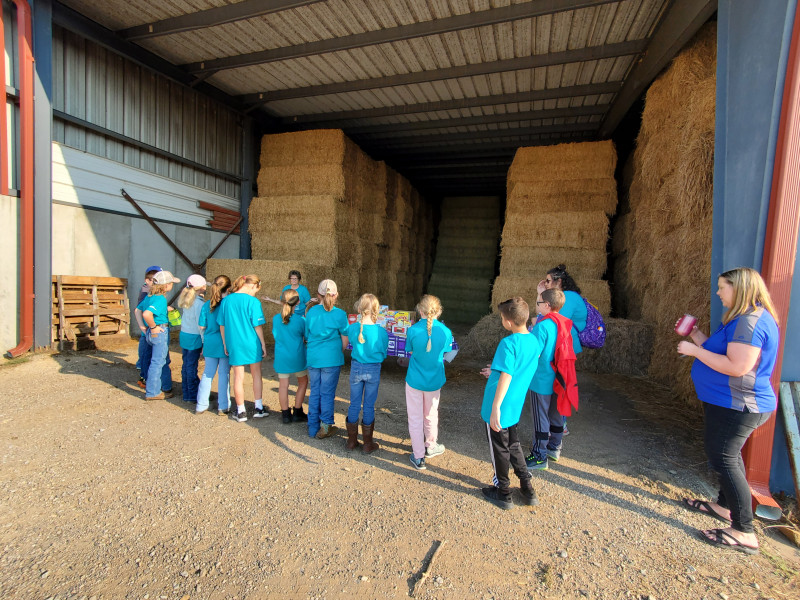By Becca Flesher on February 1, 2023
County Farm Bureaus in Kansas Teach Kids About Agriculture
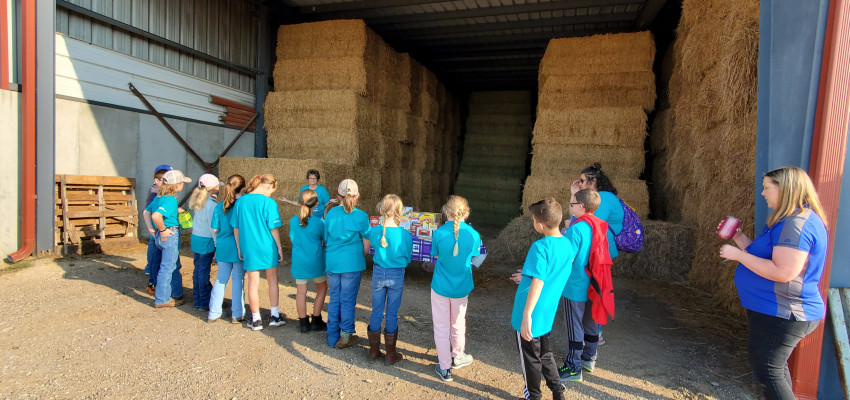
Ask your kids where their Chick-fil-A nuggets came from, or how their McDonald’s hamburger ended up on their plate, or where chocolate milk comes from. As adults, we know they come from chickens, beef cattle and dairy cows, but learning where our food comes from was an integral part of our education as children. Kids today will be in grocery stores one day, purchasing products for their own families. Teaching kids about food, farming and agriculture along the way helps them make good choices as they grow older.
Kansas Farm Bureau’s mission is to strengthen agriculture and the lives of Kansans through advocacy, education and service. County Farm Bureaus across the state support that mission in many ways, including by offering interactive, hands-on learning opportunities for kids.
Finney, Johnson and Lincoln County Farm Bureaus have made a significant impact on their communities and local youth by hosting day-long events that feature the farmers, ranchers and agribusinesses in their areas.
Finney County
Finney County Farm Bureau has held an annual Friends on the Farm event for nearly 24 years, and County Coordinator Jennifer Gerber has led the charge for 11 of those. She was at the helm Jan. 24, 2022, when approximately 730 southwest Kansas fourth graders from Finney, Haskell, Kearney and Gray counties traveled to the Finney County Exhibition Building to learn about the agriculture industry.
“We set the day up to have two sessions in the morning and one in the afternoon,” Gerber says. “Each session hosts 250 kids and twelve presenters.”
Thanks to the support of local agriculture businesses, extension agents, FFA programs and Collegiate Farm Bureau members, Finney County had more than 70 volunteers and a variety of activities and presentations for the kids. These activities included a soil tunnel with edible “soil” for a snack, a presentation on hydroponics, a milking demonstration, interaction with baby goats, a lesson about soybean byproducts, an interactive book reading and an up-close look at combines, tractors, hay equipment and crop sprayers.
“At our ag experience days, kids get to meet the local farmers and ranchers behind the presentations,” Gerber says. “They get to learn specifics of hydroponics from students in the Garden City FFA chapter who are learning how to grow plants through those systems.”
Teachers, parents and Farm Bureau members have seen the widespread benefits of the event.
“The kids don’t forget what they learn at our event,” Gerber says. “Kids still recognize me and recall what they learned when I substitute teach.”
Gerber says giving kids an opportunity to see and understand what farmers do every day is important to shed light on the challenging work done for something as common as a hamburger.
“This truly gives kids a glimpse of what agriculture is all about,” Gerber says. “Agriculture is the hub of southwest Kansas, so it’s incredibly important our youth know where their food and clothes come from.”
Johnson County
The Johnson County Farm Bureau invites every fourth grade class in the county to its Slice of Ag event, drawing thousands of kids to learn about what goes into creating pizza.
“We have eight different stations the kids interact with: grain and crops, fruits, vegetables, conservation, milk, beef, pork and the kids’ favorite — machinery,” Lyneda Rogers, county coordinator, says. “We bring in a combine and let kids explore the equipment and also sit in a cab to watch a harvesting simulation.”
The grain and crops station features visuals of ingredients that make pizza crust, along with 56 loaves of bread to illustrate what can be created from one bushel of wheat. KC metro-area kids get to touch wheat kernels and visualize just how much food that bushel can produce. A table full of fruits and vegetables highlights their contribution to a slice of pizza. A station on conservation showcases how farmers care for the soil before planting or harvesting, while a live milking demonstration shows the origin of cheese, and live cattle and pigs represent beef and sausage toppings. To top the day off, the kids enjoy some pizza.
The Slice of Ag event has become so popular that following the COVID-19 pandemic, two events were created for 2022 to provide the experience to the class that missed it the year before. The events were held at the Johnson County Fairgrounds in April and September, and local FFA chapters and county board members jumped at the chance to volunteer.
“FFA members take the kids around to sessions, help them climb into the combine or help run a station,” Rogers says. “Those students and other volunteers make it a success. Most of these FFA students aren’t from farms either, but they want to learn about agriculture and how it will impact their future careers.
“My favorite station is the Southwest Dairy Farmers mobile dairy classroom,” Rogers adds. “The milk goes through a clear tube up into a bottle and the light bulb goes off in their heads. You watch the kids realize the milk came out of the cow and went into the bottle, then it will eventually go to their house. I love giving them the opportunity to see a true farm-to-table experience.”
Since 2009, Johnson County Farm Bureau has led this program along with Johnson County K-State Research and Extension, Johnson County Conservation District, ADM, Southwest Dairy Farmers and countless volunteers. Rogers notes the importance of this event and how much the community has evolved.
“We’re an urban county — the kids don’t typically get to see agriculture in motion,” she says. “While kids in southwest Kansas pass livestock and farms all the time, this program gives our urban kids a hands-on event that focuses on agriculture.”
Lincoln County
Nearly 80 third, fourth and fifth graders from Lincoln and Lucas-Sylvan Unified elementary schools in north-central Kansas have the chance to experience agriculture each year, thanks to Lincoln County Farm Bureau’s Day on the Farm. The event is hosted at Rosebrook Farms in Lincoln every second Thursday of September. Katie Lyne, county coordinator, planned the 11th year of the program.
“The purpose of the day for us is to expose local youth to agriculture and show them all the different opportunities it has to offer,” Lyne says. “We host kids with diverse backgrounds — there are kids who have never been around tractors and others who regularly help on their family farm.”
Students experience farm life through eight sessions that are led by local businesses, farmers and volunteers.
The first station shows how corn is grown and how technology like drones can be used. Students then learn about water conservation and water cycles. A farm equipment station lets kids see the different tractors, drills and cattle trailers farmers and ranchers utilize to make the food they eat. A new safety station allows kids to see what happens when a grain cart strikes a powerline and how dangerous electricity is when we aren’t careful.
There’s a bee farm that emphasizes the importance of pollinators and offers honey samples, and a station that outlines the life cycle of poultry and displays the various sizes and colors of eggs.
One of the students’ favorite stations, according to Lyne, is the veterinarian station where kids get ultrasound goggles and watch a live ultrasound on a cow.
“You would think kids from a very small community come with the experience and knowledge of where milk or eggs come from, but that isn’t always the case,” Lyne says. “Seeing how surprised some kids are that chickens lay eggs is unexpected, but we’re happy to provide that education for anyone who isn’t already aware.”
Because the same three school classes are invited each year, Lyne rotates the stations to keep the experience unique and educational. Other stations consist of butter making, learning about grain sorghum (milo) and making ice cream in a bag. Their volunteers are local FFA students, board members, ag extension agents and farmers.
“Our event is special because of the farmers who help put it on,” Lyne says. “The event falls in the busiest time of year for our area farmers because of harvest, but they’re willing to donate their time and expertise to educate youth.
“Our hope is for kids to walk away knowing agriculture is more than just cows and tractors,” Lyne says. “While those things are important parts of agriculture, seeing how diverse yet connected agriculture is opens kids’ eyes to different possibilities.”
Kansas Farm Bureau (KFB) is committed to teaching about agriculture, no matter what age you are. Many county-level events and programs can enhance Kansans’ ag literacy, and KFB supports those efforts with a dedicated team that’s passionate about ag education. Find activities, lesson plans and other fun ideas in these locations:
KFB Website: www.kfb.org/education. You can also learn about KFB’s ag-accurate children’s book series, “Kailey’s Ag Adventures,” and find important lessons about safety in agriculture.
Pinterest: www.pinterest.com/ksfarmbureau/ag-ed-ahead. We all know the power of Pinterest! Browse ideas on our board and keep track of those you want to try by pinning to your own boards.
Ag Education from the Sunflower State Newsletter: email martins@kfb.org. Subscribe to KFB's quarterly e-newsletter for coordinators, educators and members. It also contains coordinator features and updates on ag education work at KFB.
Ag Education Classroom Kits: www.kfb.org/classroomkits. Implement one of these fun and informative kits in your classroom. KFB has two $25 kits designed for a class size of 25.
• Food and Farm Facts, for grades four through six. Includes a book for each student, activity cards, trivia deck, worksheets and activity supplies for five lessons.
• Tales of a Dairy Godmother, for kindergarten through grade two. Includes a book for the classroom, an educator’s guide with lesson plans and related magazines, worksheets and activity supplies for four to five lessons.

